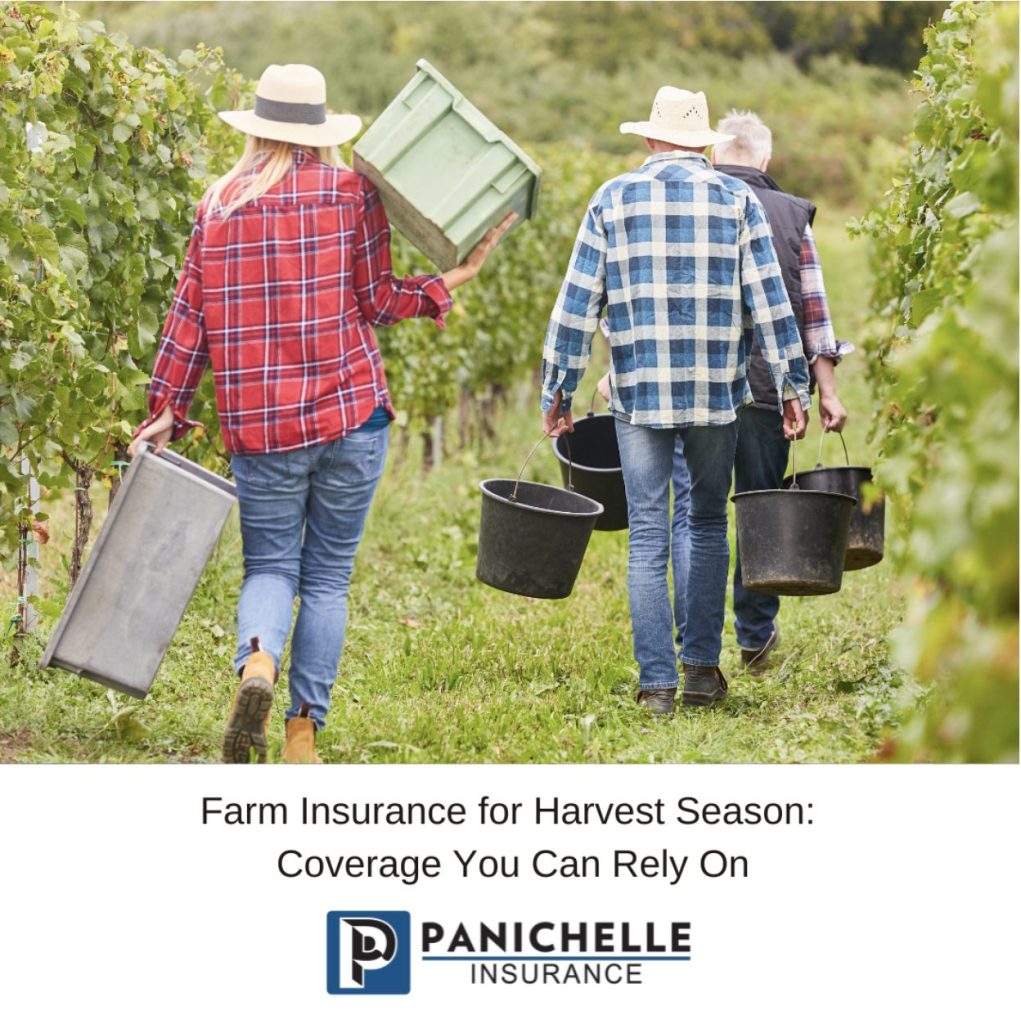As the days get shorter and the leaves begin to turn, farm owners across Pennsylvania know one thing for certain—harvest season is here. This is the most critical and often the most stressful time of year for farmers. The equipment is working overtime, crops are at their most valuable, and the risk of accidents, weather damage, and operational disruptions increases dramatically.
At Panichelle Insurance, we understand the unique challenges that come with running a farm during autumn. Whether you manage a small family farm or a large commercial operation, the right insurance coverage can protect your livelihood when it matters most. As you prepare for a successful harvest, let’s explore what farm insurance should cover—and how we can help make sure you’re protected.
Why Harvest Season Demands Strong Coverage
Harvest season is a time of high output, but also high risk. Accidents involving heavy machinery, crop loss due to unexpected weather events, and liability issues with seasonal workers or property damage are more likely during these high-activity months.
A single uninsured or underinsured incident—like a combine fire or a collision involving a grain truck—can set your operation back months or even years. That’s why comprehensive farm insurance isn’t a luxury during harvest—it’s a necessity.
Core Farm Insurance Coverages to Review Before Harvest
Here’s a breakdown of the essential components of a farm policy and why they matter most during autumn.
1. Property Insurance for Farm Buildings and Equipment
Your barns, silos, grain bins, sheds, and other outbuildings are vital to your operation. A good farm property insurance policy covers physical damage due to fire, storms, theft, and other perils.
But don’t forget your equipment. Harvest time means increased use of combines, tractors, grain dryers, and other machinery. Equipment breakdowns can cause significant financial losses—not just in repair costs, but in lost productivity. Farm equipment coverage ensures you can get back up and running fast.
Make sure your coverage reflects current equipment values. If you’ve bought new machinery or made upgrades this year, now is the time to report them to your agent.
2. Crop Insurance for Weather-Related Losses
Autumn weather in Pennsylvania can be unpredictable. Heavy rain, frost, and even early snowstorms can devastate unharvested crops.
Crop insurance, backed by the USDA and offered through private insurers like those we partner with, protects you from yield losses due to weather events and even revenue loss due to price fluctuations. Two common types include:
- Yield Protection (YP): Covers production losses due to natural disasters.
- Revenue Protection (RP): Covers production losses and declines in market price.
If you haven’t secured crop insurance yet, there are deadlines and seasonal restrictions, but our team can walk you through supplemental options or endorsements that might still be available.
3. Farm Liability Insurance
Liability protection is often overlooked—but it’s one of the most important components of a farm insurance policy.
Do you allow hunters on your land in the fall? Sell produce or pumpkins at a roadside stand? Use temporary labor to assist with harvest? Any of these increase your exposure to liability claims.
Farm liability insurance protects you if someone is injured on your property or if your operations cause damage to someone else’s property. This coverage also helps with legal defense costs, should they arise.
It’s also smart to ask about umbrella insurance—an affordable way to add extra liability protection on top of your existing coverage.
4. Livestock Coverage
For farms that raise cattle, sheep, pigs, or poultry, harvest season can be especially stressful. Increased activity around the property can spook animals, causing injury, illness, or even escape.
Livestock insurance can cover death caused by fire, lightning, electrocution, accidental shooting, and even attacks by wild animals or dogs. If you’re transporting animals off-site during fall, talk to your agent about livestock transit coverage.
5. Business Interruption and Loss of Income
What would happen if a fire, flood, or mechanical breakdown forced you to pause operations during harvest? Delayed harvests can lead to spoilage, reduced prices, or even total crop loss.
Business interruption insurance helps cover lost income and operating expenses if you can’t run your farm temporarily due to a covered event. It’s peace of mind during your most critical season.
Seasonal Workers & Workers’ Compensation
Many farm owners bring on additional labor during harvest season. In Pennsylvania, depending on the size of your operation and number of employees, workers’ compensation insurance may be legally required.
Even if not mandatory, providing this coverage protects you financially if an employee is injured while working on your farm. It also shows your seasonal workforce that you value their health and safety.
Preparing for Autumn: Quick Checklist
Before the harvest rush is in full swing, here’s a quick insurance checklist:
- Update your policy with any new machinery, structures, or vehicles
- Confirm your crop insurance is active and adequate
- Review liability limits and consider umbrella protection
- Evaluate coverage for livestock, transit, and temporary labor
- Ask about coverage for business interruption or machinery breakdown
- Ensure your workers’ comp coverage meets seasonal needs
Let Panichelle Insurance Handle the Coverage—So You Can Focus on the Harvest
At Panichelle Insurance, we’ve worked with farmers across Western Pennsylvania for decades. We understand that no two farms—or harvests—are exactly the same. That’s why we take a personalized approach to building insurance solutions that fit your specific needs and risks.
Whether it’s updating your property schedule, shopping for better crop protection, or advising on risk management for seasonal activities, our team is here to help.
Call us today at (724) 327-2600 or to review your farm policy before the combines start rolling. We’ll make sure you have the protection you can rely on when the stakes are highest.

